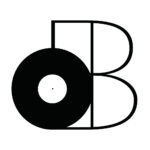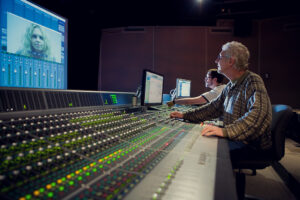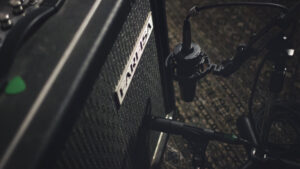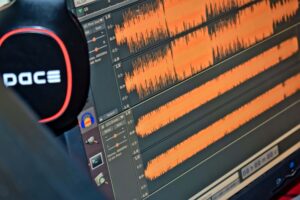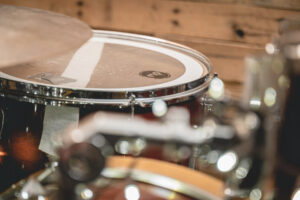As an independent artist, you’ll need to understand the laws governing intellectual property. Learning how to copyright your song is the first step to securing your future assets.
That’s right, all the music you compose, record and/or produce can eventually become valuable to you (and others).
There have been cases of “musical plagiarism” in the past, so we wouldn’t want your music to be at risk.
As a matter of fact, we’re going to be learning how to protect BOTH your compositions AND your recordings.
They are actually TWO different entities. In the music industry, publishers manage compositions and record labels manage recordings.
If you decided to take matters into your own hands, then you’ll be the one managing BOTH assets.
In other words, you’ll own exclusive rights IF…
- You composed the song
- You recorded/produced the song
However, if you simply composed the song, your producer will own the rights to the recording.
This is where things begin to get a little more complicated, but I will be breaking things down throughout this article.
Let’s start by determining the lifespan of a copyrighted song.
- Your copyrighted song’s copyright will outlive you
- How to copyright your song
- How to register your copyrighted song
- Knowing your rights as a content creator
- Licensing your copyrighted music to others
- Should you register your copyrighted song?
Your copyrighted song’s copyright will outlive you
Rest assured that your music will be copyrighted throughout the duration of your life. In the US and in Europe, it will actually remain yours for precisely 70 years after your death (or the last owner’s death).

After the copyright has expired, it can officially become public domain (PD).
However, all of this applies to the composition, NOT the sound recording. Technically speaking, the song’s recording should never expire, BUT…
Laws seem to have changed in the UK. From the date of creation, a sound recording’s copyright now lasts for 70 years.
In other words, make sure you are familiar with YOUR country’s legislation when it comes to copyrights.
Distinguishing a composition from a recording/production is quite important. This is why artists are allowed to record “cover songs” and profit from them.
You could achieve this simply by obtaining a license from the publisher and disregard the record label.
Often times, this would be the most “cost-efficient” method for getting a popular song on a commercial, for example.
How to copyright your song
So, how can we copyright our music anyway? I actually had the opportunity to ask an intellectual property lawyer this very question.

Basically, it’s generally understood that the moment a melody and/or lyrics are imprinted onto any medium (paper, phone, computer, etc…); it is copyrighted.
The same goes for sound recordings… The moment it has been recorded in any shape or form (tape recorder, phone, computer, etc…); it is also copyrighted.
For some reason, that explanation did not satisfy me. It didn’t seem official.
So I asked if there was a more “legitimate” way of copyrighting my music…
Apparently, you can “go the extra mile” by registering your work with your copyrights office (we’ll get into this shortly).
But I was recommended a simpler method (which didn’t cost anything). You could simply mail and/or email your composition and recording to YOURSELF.
As long as the “package” has been timestamped (email usually is), it serves as evidence.
For most of us, this method is sufficient. Posting your music on your domain is another way of securing ownership.
You can even publish it to certain platforms such as YouTube, Spotify, Apple Music, etc…
How to register your copyrighted song
I learned that unregistered songs do have somewhat of a disadvantage. You could still action somebody who “stole” your work if it hasn’t been registered, but you can’t file an infringement suit.

Basically, you’re always entitled to compensation based on the “thief’s stolen earnings”, but that’s IT.
Proving ownership is also more difficult if you haven’t registered your song, but not impossible.
You just wouldn’t be capable of pursuing the defendant for any more than the damages they have personally caused you.
If you’re not that far into the game, you might find that paying a fee to register your music is too much. It costs 29.99$ per application and that doesn’t include the filing fee of 35-55$ (U.S. copyright office).
It can add up pretty quickly, so I suggest following at least ONE of the procedures in the previous section.
However, if you really wanted maximum coverage, you could register your work via…
Make sure you consult the laws on intellectual property governing your country before applying.
Here are a few advantages you’ll obtain from registering your copyright…
- Public record of ownership
- Ability to file infringement suits (up to 150,000$)
- Evidence in a court of law
- Protection of importation against infringing copies
Knowing your rights as a content creator
Did you know that even by licensing your music, you still retain exclusive rights? Unless you sell your exclusive rights, you still retain ownership of the original work.

This basically means that you can re-sell your music to as many individuals as you’d like.
Of course, this all assumes that you are the ONLY contributing artist. If there were many artists involved in the creation of a song, this needs to be settled using an agreement.
For example… Your band releases a song in which the music was composed by yourself, but another bandmate wrote the lyrics.
You’d need to divide ownership of this intellectual property accordingly. To avoid problems, it is best to make this clear as early as possible.
Publishers and record labels can also claim certain ownership via an agreement.
As I mentioned earlier, things can get complicated with multiple parties (it will all make sense in the next section).
The important thing is to retain awareness of your rights as to not get taken advantage of. As the composer, you’ll ALWAYS have exclusive rights to the composition.
If you’ve recorded/produced it as well, then you have exclusive rights to the recording as well, BUT…
When you pay to record a project in commercial recording studios, make sure to receive the appropriate licenses as well.
Licensing your copyrighted music to others
This last section will explain the most complicated aspect of copyrighting music; licensing. If you own exclusive rights, then you can legally distribute ALL licenses.
There are 6 licenses we need to be concerned with:
- Synchronization License | As soon as a recording will be synchronized with a moving picture, it requires a Synchronisation License. This applies to television, film, advertisement, etc…
- Mechanical License | As soon as a recording will be manufactured in a physical format, it requires a Mechanical License. This applies to CD, vinyl, tape, etc…
- Master License | As soon as a recording will be used on any project, it requires a Master License. Usually, they are distributed with Synchronisation Licenses as they are very similar.
- Public Performance License | As soon as a composition will be broadcasted to an audience, it requires a Public Performance License. This applies to venues, radio, streaming, etc…
- Print Rights License | As soon as the written composition needs to be reproduced, it requires a Print Rights License. This applies to songbooks, partitions, transcriptions, etc…
- Theatrical License | As soon as a composition is used in a theatrical performance, it requires a Theatrical License. Usually, they are distributed with Public Performance Licenses as they are very similar.
If you’re the sole proprietor of the song in question, you won’t need to worry, BUT…
Being affiliated with publishers and record labels involve a fair bit of managing on your part.
You need to know who owns WHAT and HOW MUCH.
Generally, publishers will own Public Performance and Print Rights Licenses. Record labels may own Synchronisation, Mechanical and Master Licenses.
In other words, you can’t sell licenses you don’t own.
As an independent artist though, you can make a living licensing your music.

Should you register your copyrighted song?
Just so we’re clear, a song is automatically copyrighted the moment it is created. The problems arise when we have difficulty proving our ownership.
If you follow my suggestions, you should have no difficulty creating concrete evidence.
- Mail it to yourself
- Email it to yourself
- Publish it on your own domain
- Publish it to YouTube, Spotify, Apple Music, etc…
In the digital age, EVERYTHING is time-stamped in some way or form. The only proof you need is evidence that you created it FIRST.
However, it is clear that you would have much more difficulty than if you registered your song.
If you’re relying on your songs to pay the bills, you should consider registering them with…
This will ease your conscious mind should ANY infringement occur. You’ll be guaranteed proof of ownership.
But most importantly, be aware of your licenses. When music and money are connected, we need to make sure we have the appropriate licenses.
Buyers and sellers are BOTH concerned when it comes to legal matters.
I hope you’ve found this article to be insightful and if you have, please share it with another musician. Have you ever had any difficulties when it came to protecting your copyrights? Let us know in the comments and feel free to share your own personal advice as well.
I am not a lawyer, so take everything I say with a grain of salt. If you are really interested, you should speak with a lawyer that specializes in intellectual property.
